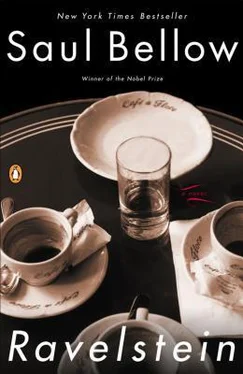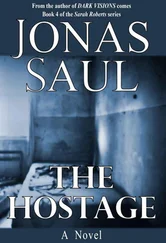Roughly forty percent of intensive care patients die in the intensive care unit. Of the remainder some twenty percent are permanently disabled. These invalids are sent to what the health industry calls "chronic care facilities." They can never be expected to lead nor mal lives. The rest, the lucky ones, are said to be "on the floor."
On the floor, I was no longer attended by the ICU team of physicians. Worn out by hundreds of hours in the unit, two of them now stopped by to say that they were going on holiday. Because I was one of their great successes they looked me up on the floor to say good bye. Dr. Alba brought chicken soup from her own kitchen. Dr. Bertolucci's gift was a homemade lasagna dish and a supplement of meatballs in tomato sauce, like the one I had eaten in intensive care. I was still unable to feed myself. The spoon shook in my hand and rattled the dish; I couldn't bring it to my mouth. Dr. Bertolucci came to dine with Rosamund and me. Far from normal, I kept bringing the conversation back to the subject of cannibalism. But Dr. Bertolucci was very pleased with me saying, "You're just about out of the woods." He had saved my life. I was sitting up, eating a dinner the doctor himself had cooked, and chatting, nattering away. Rosamund too was pleased and excited. This was my first night on the floor, and I wouldn't be going to a chronic care institution to begin a cripple's life.
When I was transferred to the floor the neurology resident gave me a preliminary examination. My medical history in a thick binder was available at the nurse's station. Rosamund had kept a journal of her own during the weeks of crisis and the resident questioned her too.
That same night, Dr. Bakst, the chief neurologist, appeared at midnight and he too questioned her. She had been asleep in the armchair beside the bed.
I had been treated for pneumonia and heart failure. And though I was on the floor, I was not out of the woods. Not yet. Not quite. What my problems were is only partly relevant here. Let me say quite simply that things were far from normal, and that my future was still uncertain.
Dr. Bakst came with his packet of pins. Examining me-sticking pins into my face-he discovered that my upper lip was (to put it in my own way) lame. Even when I spoke or laughed it was strangely immobile or partially paralyzed. He put me through some simple tests-I failed them. At various times he asked me to draw clock-faces. I was unable at first to draw anything. My hands were useless. I had no control of them at all. It was impossible for me to eat my soup or to sign my name. I couldn't manage a pen. When he said, "Do me a clock," a crabbed zero was all I could draw. My symptoms seemed to Dr. Bakst to be due to poisoning. Bйdier in Saint Martin had served me a toxic fish. The neurologist said that I was a victim of cigua toxin. I was now willing to believe the worst about the Caribbean. The French doctor I saw there had diagnosed my trouble as dengue. He might, just possibly, have known better. An Australian cigua-toxin expert described the symptoms of that disease on the telephone to Dr. Bakst in Boston. Some of Bakst's Boston colleagues did not accept the diagnosis. I was partial to Bakst, however, for reasons which had little to do with medicine, strictly speaking.
To put matters plainly, I had to decide whether I should or should not make efforts to recover. I had for long weeks been un conscious, my body was wasted-unrecognizable. My sphincters were confused and I wasn't so much walking as stumbling-hanging on to a metal frame. I had once been the youngest of a large family. I now had adult children of my own. When they came to visit, those that had inherited my features gave me the feeling that I was being looked at by my own eyes-still germane but soon to be re placed by a later model. Ravelstein would have advised me to keep my head. I felt very nearly done for but I was, however damaged, sick of it all, not yet discharged from the service.
Rosamund was determined that I should go on living. It was she, of course, who had saved me-flew me back from the Caribbean just in time, saw me through intensive care, sleeping in a chair be side my bed. When I struggled to breathe she would raise the oxy gen mask to swab the inside of my mouth. It was not until the respirator was brought in that she went home for an hour to change into clean clothing.
The one physician who came regularly to visit me was Dr. Bakst. He came irregularly, too-at odd hours. He would say, "Draw me a clock at 10:47." Or, "What is today's date? Now, don t tell me you live on a superior plane and don't have to know exact dates. I want specific answers from you." Or, "Multiply seventy-two by ninety-three-and now… divide five thousand three hundred and twenty-two by forty-six."
Thank God I had kept my multiplication tables in good order. He had no wish to discuss "deeper" questions with me-or questions relating to the extent of my recovery.
At the age of eight I had had to recover from peritonitis complicated by pneumonia. Returning from the hospital what I needed to decide was whether I was going to be a lifelong invalid with two older brothers hating me for monopolizing the affection and concern of our parents. How such decisions are made in childhood is beyond comprehension. I see now, however, that I chose not to be a weakling. In some junk shop I turned up a book on physical fitness by Walter P. Camp, and I did as the famous football coach had done-I carried full coal-scuttles at arm's length up from the cellar. I chinned myself, I worked out with a punching bag and Turnverein Indian clubs. I studied an inspirational tract called _How to Get Strong and How to Stay So__. I told everyone I was in training. This was no exaggeration. And the fact was that I had no gift for sports. Still the choice I had made at the age of eight remained effective. Some seventy years later I was preparing to do it again.
By a rare coincidence, Dr. Bakst had another patient upstairs with cigua toxin. She had been infected on a trip to Florida. The toxin ravages the nervous system but is soon excreted, so that in a few days there is no sign of it. Luckily in her case the disease was caught in an early stage, and after the fish-carried poison was filtered out of her bloodstream she was well enough to go home.
I was still pushing the walking frame through winding corridors, determined to recover the use of my legs. I was held upright in the shower and felt humiliated as I was soaped and rinsed by kindly nurses who had seen everything and were not shocked by my body.
I assumed that my senior neurologist and good angel was familiar with cases like mine and knew exactly "where I was at." My damaged hands and legs would wither and my sense of balance would be lost if the small muscles were allowed to atrophy. If I were inclined that way, I could decide not to make the effort. You do get tired of performing the tricks, kneading the ball of putty and fitting jigsaw puzzles together only to see, when you examined yourself, the long wrinkles of your desiccated inner arms.
It's only now that I come to understand how much tact there was in the doctor's conduct and to see that he knew perfectly well I would disintegrate if I didn't do the drill he prescribed. I loathed the drill but I couldn't allow myself to fall apart. Moreover, I owed it to Rosamund to work at recovery. Yes, I was tempted to drop out, but she had concentrated her soul entirely on my survival. My quit ting would be an insult to her. And, lastly, to live necessarily meant to do what I had always done, and I had to be strong enough to perform independently the jobs of which my life consisted.
Dr. Bakst was a crack diagnostician, I considered, but in my case his diagnosis had been challenged. Ciguatera toxin is a tropical disease. The toxin is carried by reef-feeding fish-"piscavores" the doctor called them. No amount of broiling or boiling could destroy the poison carried by the red snapper set before me by Bйdier, a tough guy playing the Frenchiest of French hosts. He had come to the tropics to make money to educate his little daughters-they no longer get a _dot__, they get an education. (Ravelstein, who haunts these personalities and occasions, would have preferred to have me say _dot__, not dowry.) Beyond playing the role Bйdier owed his clients nothing. They took their chances with the piscavores of the coral reef, as he did with his investments. Neither Bйdier nor the doctor who had told me that I had dengue answered the inquiries from Boston.
Читать дальше












